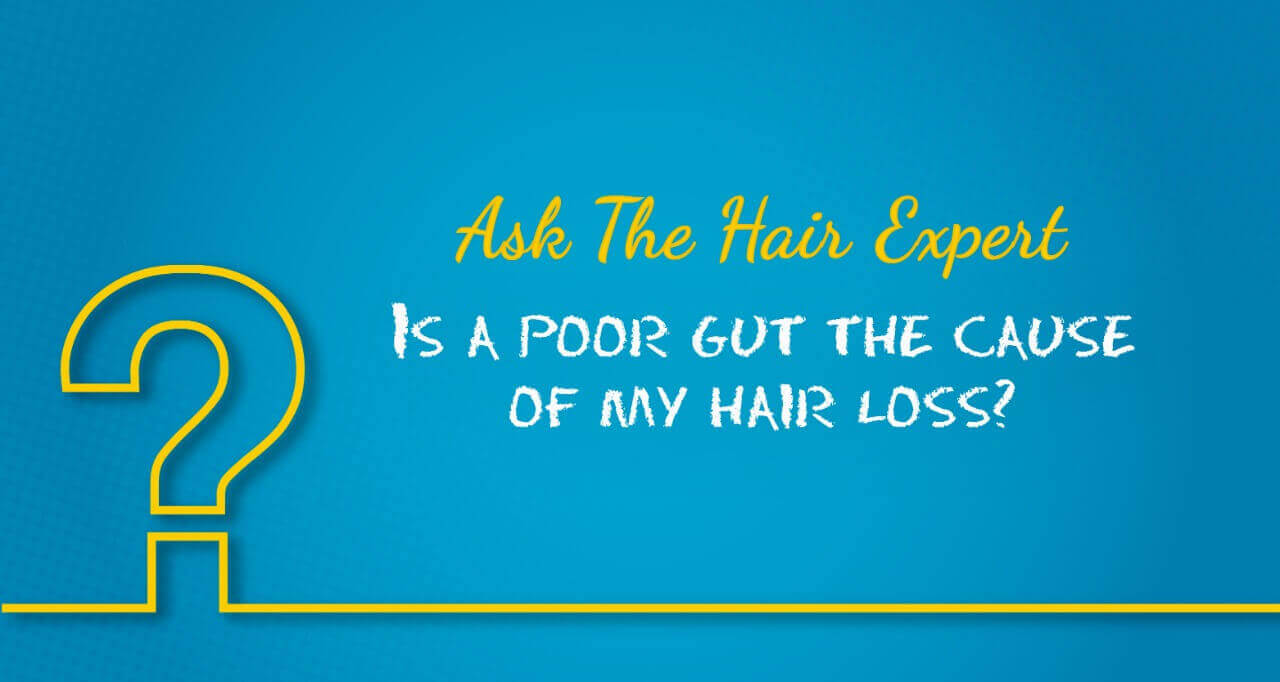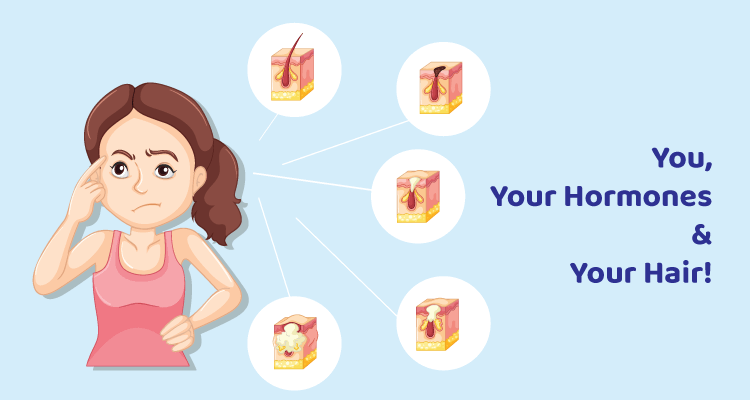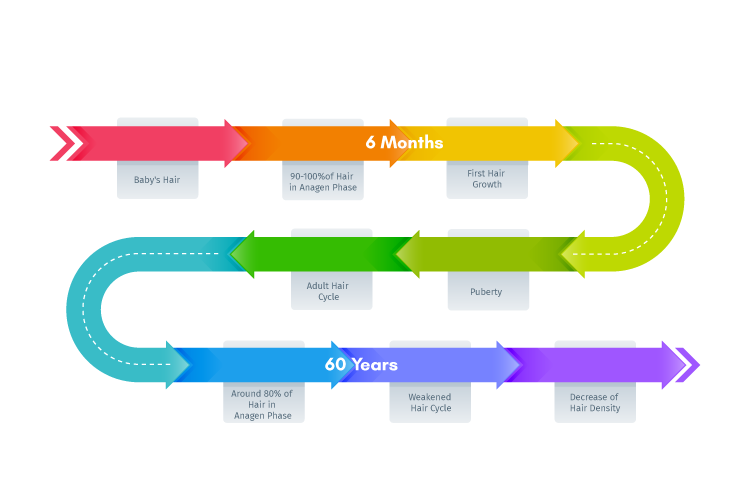
Hair thinning because of poor digestion.
Doesn’t sound too related or logical when you hear it like that,right? Who would think these two things are connected? But they are…
Poor digestive system and related disorders are a problem in most, especially in these supposedly ‘modern times’, with irregular eating habits, trending diets, lifestyle irregularities etc. Most people further resign to their gut’s reaction as ‘this is how my body behaves’, while a few sort it out with a physician’s advice if it bothers much. However in all of this, there is really no correlation made between chronic digestive disorders and hair health. It’s just not something that would naturally occur to one.
However chronic problems with your digestive system can also affect your hair growth cycle or lead to hair loss. We have had to explain this to many surprised faces at our clinics in the past. And off lately, on our online consultations.
So, today on our Ask the Hair Expert series, we figured we will address this topic, and answer some pertinent questions that have come our way in recent times. We will also attempt to highlight relevant information, facts, prevention tips and solutions for the same.
You asked: “Can stomach problems affect hair growth? Is a poor digestive system the cause of hair loss? What are IBD and IBS? Do they have a connection with hair?”
Here’s the answer from the Hair Experts.
Yes. There is very much a connection between your digestive system and your hair.
Your digestive system is much more than a system that handles nutritional assimilation. It is a complex, diverse ecosystem inside your body by itself – the gut microbiome! The digestive system is intricately connected with various parts of your body. It is also an interface between your body’s internal systems and the external environment. Just as your hair is. For the well being of your body, and your hair, it is imperative that the integrity of the gut microbiome is intact and your digestive system is working fine!
Science very clearly shows that hair growth and its retention have much to with your internal health, as it does with your genetic predisposition and lifestyle. While basic hygiene is maintained with an oil-wash-conditioning routine or getting those regular trims, what really gives your hair that bounce and shine, comes from within. Your immune system, nutrition levels, genes, stress levels, lifestyle habits, AND your gut microbiome play a significant role in your hair’s health!
Let’s deep dive to understand more about your gut, the digestive system and how it’s dysfunctioning can impact your hair.
Role of Digestive & Systemic Enzymes
Almost every process in the human body undergoes chemical reactions to attain certain results. There are the catalysts that help in keeping the human body healthy, nourished and functional. Digestive and systemic enzymes are such catalysts that stimulate hair growth besides improving overall circulation in the body.
Enzymes play a key role in the maintenance, repair & building functions, ensure nutritional absorption, help with tissue repair, ensure immune system functioning and much more. Depletion of these enzymes can have a detrimental impact on your well being, and your hair.
While on one hand, digestive enzymes help you avoid discomforts such as bloating, indigestion and gas, systemic enzymes, on the other hand, take care of the overall health and wellness. They break down various substances like allergens, fibrin, mucus, clotting factors and toxins that move through the body and regulate blood circulation. Thus, inadequate levels of these enzymes can lead to health problems.
When it comes to impact on hair, your systemic enzymes are key for hair growth. They clear impurities from the bloodstream and help improve blood flow. And as you know, this is a must for a proper hair growth cycle, i.e. stimulating hair growth.
When your blood circulation is on point, it means that your scalp will get the blood (nutrition) it needs, and as will your hair follicles. And as follows, if there is a disruption or slow down of blood circulation, your hair follicles (and thereby hair growth) suffer…leading to hair loss.
As we all know, a well-maintained diet is key to good health, that includes having a robust digestive system. If your bodily functions, as with the digestive system, are not carried out correctly, the circulation is disturbed thereby leading to poor health. And, bad health = bad hair!
Before we move on to understanding the hair disorders that can arise from digestive disorders, let us briefly look at the most common digestive disorders.
- Gastroesophageal Reflux Disease (GERD) – This is when your stomach acid rises up/ backs up in your esophagus and you have a burning sensation and/or pain in your chest. This is also commonly called acid reflux.
- Celiac Disease – This is when you have a serious sensitivity to gluten, wherein your immunity system attacks when you consume this protein. The condition hampers the absorption of nutrients in your small intestine.
- Gallstones – These are deposits that get formed in your gallbladder, which is the organ that secretes bile for digestion. These ‘stones’ block the path from the gallbladder to your intestines.
- Inflammatory Bowel Disease (IBD) – This is a structural disease that results in chronic inflammation and affects the gut. It is further categorized into 2 types namely, Ulcerative Colitis and Crohn’s Disease. While both these involve severe diarrhea, abdominal pain, fatigue and weight loss, the possible cause of Inflammatory Bowel Disease is immune system malfunctioning. Although hair loss is not strongly believed to be prevalent in individuals suffering from IBD, it is seen as an uncommon side effect of the disease or medication intake for the treatment, nutritional deficiency, stress, etc.
It could be possible that people with IBD may experience alopecia, i.e. hair is lost from some or all parts of the body or telogen effluvium, a common type of hair loss involving widespread thinning of the hair. - Irritable Bowel Syndrome (IBS) – Irritable Bowel Syndrome is a functional disease, causing unusual belly pain and bowel movements. While there are certain symptoms and signs that determine whether one has this syndrome or not, the actual cause is yet unclear. Studies have indicated that as much as 10 to 15 percent people worldwide suffer from this syndrome. However, it is believed that IBS and the immune system are linked to each other and changing your diet plan with your doctor’s recommendation can help treat the condition.
Of these when you have chronic IBS or IBD concern, you may end up with hair concern. It should be noted that not everyone with an IBS or IBD will suffer from a serious hair concern. Such conditions merely push up the possibilities of hair concerns further…
Basically, studies have shown that your gut microbiome not only supports the production of some of the nutrients needed for hair growth but it also supports the hormones that control the hair growth cycle – transition between the anagen, catagen, and telogen phases. The microbiome also maintains the conditions in your body that will boost or favour healthy hair growth. Further, when everything is in order, your gut microbiome can also help to beat the inhospitable bacteria that can cause hair loss or thinning.
Digestive Disorders causing Hair Disorders
Hair reflects an individual’s inner health status. While thick and shiny hair reflects good health, thin and brittle hair point underlying health issues, stomach disorders being one of them perhaps.
Hair reflects an individual’s inner health status. While thick and shiny hair reflects good health, thin and brittle hair point underlying health issues, stomach disorders being one of them perhaps.
Even after chewing the food well and enzymes doing their work, there are some types of fibers that the stomach acid doesn’t break down. Further, if your body lacks vital gut flora that helps to extract the maximum amount of nutrients from the food, you could experience health problems.
Your gut helps procure vital micronutrients, which your body will otherwise struggle to obtain, such as biotin, vitamin K, B12, niacin, and folic acid. Further, in connection to your hair, a healthy hair fiber composition relies on amino acid metabolism which requires macronutrients to be properly broken down in your digestive tract, by the innate digestive proteolytic enzymes, with the assistance of gut microbiota.
While your diet may be rich and well-balanced, any disturbance in the digestion process affects your hair. A poor gut flora leads to thinning hair and ultimately causes hair loss. Your body loses the ability to procure the nutrients mentioned above; each of it having a significant relation with your scalp and hair health.
- Biotin helps to boost the health of your hair, skin, and nails. Insufficient biotin levels in the body may lead to hair loss.
- Deficiency of Vitamin B12 in the body can link its connection to greying hair. Do read our blog on premature greying.
- Spinach, green beans, broccoli, and kale are rich sources of Vit K and including them in your diet helps maintain healthy hair and stimulate its strength.
- Niacin, also known as Vit B3, one of the 8 B Vitamins has the ability to improve the health of your scalp and hair.
- Folic acid is primarily known to keep cells and tissues healthy, and a hair-growth treatment measure.
These vitamins help in improving the overall thickness of the hair. This apart, they also help in hydrating the hair shaft and thereby preventing split-ends.Your gut microbiome in fact synthesizes some key ingredients needed for healthy hair growth.
One of the most important ones to discuss here is Biotin (Vitamin B7 or Vitamin H). Your body uses this to metabolize the amino acids needed to produce keratin (the proteins that make up your hair). As you are aware, you can get the biotin you need from your diet and supplements, but it is important to understand that some strains of beneficial gut bacteria produce it as well.
Another fine example is Vitamin K2 that regulates the calcium in your body. It decides where the calcium is needed and in what quantity. Excessive calcium in the blood vessels on your scalp, for instance, may cause interference in the blood flow to hair follicles. Vitamin K2 is produced by your gut bacteria.
Gut flora also impacts the hormonal balance in your body. The gut bacteria help regulate the various hormonal levels in your body. This includes those hormones fairly directly related to your hair growth, like testosterone, estrogen, and cortisol. Do read our blog on how hormones influence your hair.
When the gut microbiome is in balance, it helps decrease the bad bacteria that leads to hair loss and/or thinning. When your gut flora goes out of balance, the production of many hair-essentials go down, as discussed above.
When your gut is in order, it ensures that your hair is getting the nutrition it needs, your body’s reaction to stress is moderated and your immune function is optimised. More often than not digestive disorders can be corrected via diet regulations and stress controls.
Do read our blog on the importance of a balanced diet, with all these essential nutrients including hair growth vitamins, for your hair. When your digestive system is malfunctioning, you need to ensure that you supplement your nutritional intake right, to bring it back on track, to ensure that your body and hair’s needs are taken care of.
Hair Loss caused by stomach disorders, a poor gut
Whatever the reason, thinning of hair or losing hair is not an experience anyone would wish for. It’s distressing and difficult. While on one side you may be battling a digestive disorder, on the other side you see your hair falling.
It is key to understand that as high as 70% of your immunity level is gut health. When you take care of it, it can have an enormous effect not just your immunity, your energy levels and your hair. If you notice certain signs such as bloating, excessive gas and/or lethargy, along with hair fall, it could be a signal that there is something in your digestive system that is calling for help! Do re-evaluate your diet and your lifestyle. Here below are some basic tips to correct your course. However, do seek medical attention to detect the underlying cause right, if small changes do not seem to be making an impact!
- Lifestyle changes
What you eat, when you eat what, how many hours you sleep, whether you are active or work out every day, are there any occupational hazards you are exposed to…these are some of the things that will need to be evaluated. ‘Cos all of this has an impact on your gut, which in turn impacts your overall health. Any course correction as needed here will help in coping up with digestive disorders , managing other internal bodily functions and help ensure your well being. - Maintaining Your Diet
A healthy diet is essential for reducing the risk of IBS or IBD. It is advised to consume a diet that focuses more on complex carbohydrates, vegetables, lots of water, fermented foods, and probiotics to promote a better balance of gut bacteria. Do consume healthy proteins, fiber and whole, raw food as much as possible. This will ensure a healthy gut. Also, if you can recall from our earlier blogs, hair cells are amongst the fastest-growing cells in your body. They need adequate nutrients and energy to sustain their hectic activity!
Having said that, yes, sometimes even when you feel your diet is ‘just right’, your digestion may be impaired and thereby the nutrient absorption. Treating the bacteria affecting it all may need to be treated. Always watch out for signs of concerns, and seek medical advice. Perhaps some part of the diet may need a course correction though not evident to you! - Stress Management
Stress is a recognised gut health disruptor. And needless to repeat, stress and hair loss go hand-in-hand. Where there’s stress, there is loss of hair! Stress can cause issues with the digestive system, both directly and indirectly. Stress induces microbial shifts. While in a normal healthy person the microbiome behaviour is predictable, in an individual undergoing high stress, its behaviour and responses are very varied.
Regular exercise or following stress management techniques may or may not show an immediate result on regrowth of hair but will certainly prove beneficial for a healthy life and healthy hair in the long run. Your trichologist is always available to explore options for regaining lost hair and to control hair loss meantime!
The growth of healthy gut flora has multiple benefits! As they say, the way to a healthy heart is through a healthy gut, the way to healthy hair too is through a healthy gut! It not only keeps you energized but also balances your mood improves, your ability to absorb nutrients and digest them, helps you get away from the annoying bloating and inflammation. In the long run, all measures that you take to ensure gut health, assure you better hair and better health life long.
In addition, seeking out a trichologist at timely intervals can help you understand your hair’s quality, texture, growth cycle or any underlying health concerns. It’s the perfect solution to be assured of a healthy body, healthy hair and an awesome look!
Trust we have addressed those questions we started with! If you wish to garner more information on any specific concern within this or beyond, don’t forget, we are just a call away! You can also write to us by commenting below, on the blog.
Do check out our blogs on Hair Treatment, Hair Loss, Hair Trivia, Haircare, and also Laser Hair Reduction … Like, Follow, Subscribe to our social media pages to get bits and pieces of everyday dose on all things hair!









